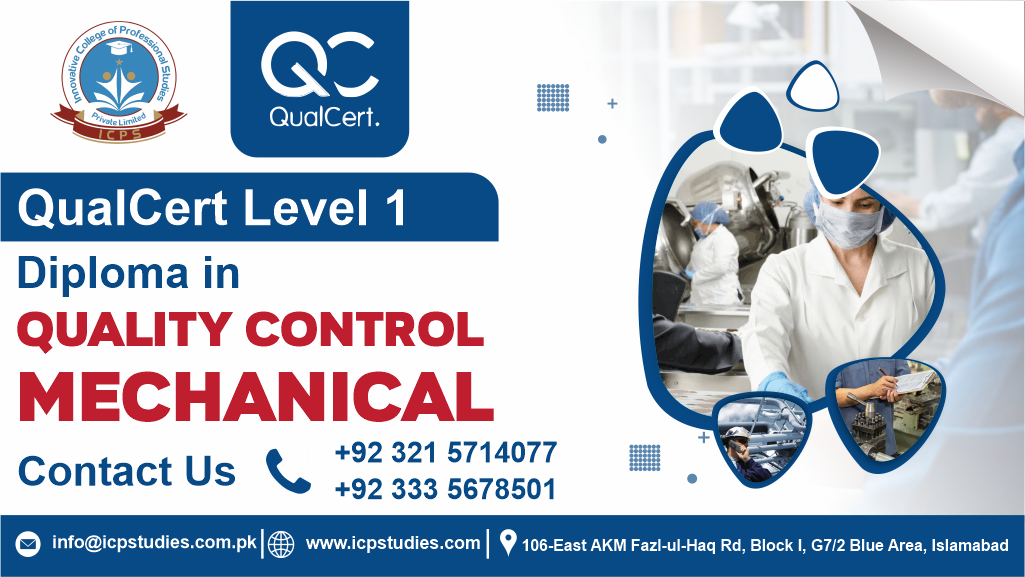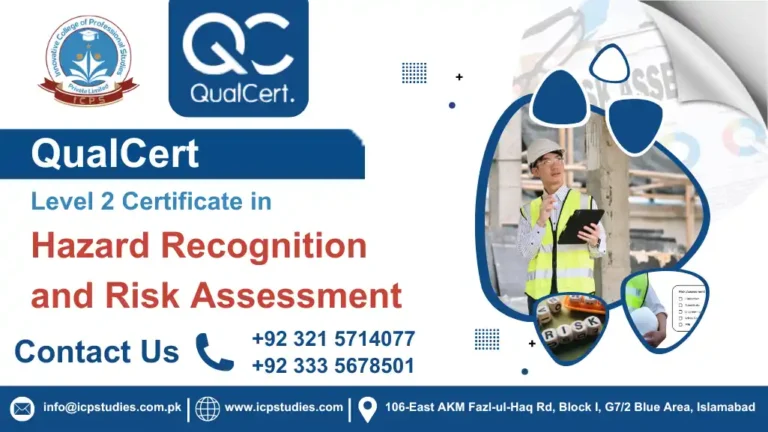In today’s competitive global job market, gaining industry-recognized qualifications is crucial for career progression. The QualCert Level 1 Diploma in Quality Control (QC) Mechanical provides a fantastic opportunity for individuals aiming to establish a career in mechanical quality control. This UK-based, assignment-based diploma is globally accepted, offering essential skills and knowledge to ensure high-quality standards are maintained in mechanical manufacturing processes.
The QualCert Level 1 Diploma in Quality Control (QC) Mechanical is designed to introduce individuals to the essential principles and practices of quality control within mechanical engineering and manufacturing. With a focus on both theory and practical application, the diploma provides learners with the necessary tools to ensure that mechanical products meet the required quality standards.
The QualCert Level 1 Diploma in Quality Control (QC) Mechanical offers a comprehensive overview of key quality control concepts specific to the mechanical industry. The course is designed to be flexible and practical, with learners gaining hands-on experience in applying quality control techniques to mechanical products and processes.
Enroll today in the QualCert Level 1 Diploma in Quality Control (QC) Mechanical and take the first step towards achieving a successful career in quality control!
All About QualCert Level 1 Diploma in Quality Control ( QC ) Mechanical
Course Overview
The QualCert Level 1 Diploma in Quality Control (QC) Mechanical is a comprehensive, UK-based certification designed for individuals seeking to gain foundational knowledge and practical skills in mechanical quality control. This globally recognized qualification equips learners with the essential tools to ensure high-quality standards in mechanical manufacturing, engineering processes, and production systems.
As industries around the world continue to prioritize precision, reliability, and efficiency, the need for skilled professionals in quality control has never been greater. The QualCert Level 1 Diploma addresses this demand by offering a flexible, assignment-based learning approach, allowing learners to complete coursework at their own pace without the pressure of exams. This makes the course accessible to individuals who may already be working or have other commitments.
Throughout the diploma, participants will explore core topics such as quality control tools, mechanical processes, defect detection, and quality documentation, all essential for ensuring that mechanical products meet rigorous industry standards. With a strong emphasis on practical application, the course prepares learners to handle real-world quality control challenges and make meaningful contributions to the mechanical sector.
Upon successful completion, learners will earn a recognized qualification that can enhance their career prospects and provide a solid foundation for further advancement in the field of quality control, mechanical engineering, and manufacturing. Whether you’re entering the workforce, looking to formalize your skills, or aiming for career advancement, the QualCert Level 1 Diploma in Quality Control (QC) Mechanical is the perfect starting point for a successful journey in the quality control industry.
Study Units
- Fundamentals of Quality Management
- Quality Control in Earthworks
- Sampling Techniques in QC
- Quality Incident Reporting
- Introduction to Sustainability in QC
The QualCert Level 1 Diploma in Quality Control (QC) Mechanical is designed to be accessible to a wide range of individuals, regardless of prior experience. However, to ensure you succeed in the course and make the most of your learning experience, there are a few general recommendations and guidelines for entry:
- Basic Understanding of Mechanical Concepts
While no formal qualifications are required, a basic understanding of mechanical engineering concepts will be beneficial. This could include familiarity with common mechanical processes, materials, and manufacturing techniques. If you have some experience in mechanical or manufacturing roles, this will also support your learning. - Proficiency in English
As the course is delivered in English, learners must be able to understand and communicate in English. This includes reading and writing skills sufficient to complete assignments, as well as understanding the course materials. - Age Requirement
There is no specific age requirement, but learners should be at least 16 years old to enroll in the QualCert Level 1 Diploma in Quality Control (QC) Mechanical. - No Prior Qualifications in Quality Control Needed
This course is ideal for individuals who are new to the field of quality control. There are no prior qualifications in quality control or mechanical engineering required for enrollment. The course is designed to teach you the fundamentals from the ground up. - Access to a Computer and the Internet
Since this is an assignment-based online course, learners must have access to a computer with an internet connection in order to complete assignments, access course materials, and submit work digitally. - Motivation and Commitment
As the course is self-paced, learners must be motivated and committed to completing the assignments and meeting deadlines. A proactive approach to learning will help ensure successful completion of the course.
Additional Notes:
This course is suitable for a wide range of individuals, including:
- Aspiring Quality Control Professionals with no prior experience in the field.
- Mechanical Engineers, Technicians, and Manufacturing Workers who wish to enhance their quality control skills.
- Career Changers interested in transitioning into quality control or mechanical engineering.
- Supervisors and Managers in mechanical or manufacturing roles seeking to formalize their knowledge of quality control processes.
If you meet these entry requirements or are eager to learn, the QualCert Level 1 Diploma in Quality Control (QC) Mechanical is the perfect opportunity to build a solid foundation in the field of mechanical quality control!
The QualCert Level 1 Diploma in Quality Control (QC) Mechanical is designed for a diverse range of individuals who are looking to either enter the field of quality control in the mechanical industry or formalize their existing knowledge. Whether you’re new to the industry or already working in a related field, this qualification can open doors to career growth and advancement. Here’s a breakdown of who can benefit most from this course:
1. Aspiring Quality Control Professionals
If you’re interested in starting a career in quality control, this diploma provides the foundational knowledge and skills required to enter the industry. You’ll gain a thorough understanding of the basic principles of mechanical quality control, setting you up for success in various entry-level QC roles.
2. Mechanical Engineers and Technicians
Mechanical engineers, technicians, and professionals working in related fields will benefit from formalizing and enhancing their knowledge of quality control. This diploma helps you integrate quality control practices with mechanical processes and provides you with the necessary tools to ensure that products meet the required specifications and industry standards.
3. Manufacturing and Production Workers
If you’re working in manufacturing or production environments, this course will strengthen your ability to monitor and control the quality of mechanical products. It will equip you with the knowledge to detect defects, troubleshoot issues, and ensure that quality standards are consistently met on the shop floor.
4. Career Changers
For individuals looking to transition into the mechanical quality control field from another industry, the QualCert Level 1 Diploma provides the essential knowledge and practical skills needed to successfully make the switch. The course is accessible to those with little to no experience in quality control or mechanical engineering.
5. Supervisors and Managers in Mechanical or Manufacturing Sectors
If you’re already in a supervisory or managerial role within mechanical engineering or manufacturing, this diploma will deepen your understanding of quality control processes. It will enable you to better oversee quality control practices, ensure that your team adheres to industry standards, and improve overall production efficiency and quality.
6. Individuals Looking to Pursue Further Education
If you’re looking to build a career in quality control or mechanical engineering, the QualCert Level 1 Diploma is an excellent starting point. It lays the groundwork for progressing to more advanced certifications, such as QualCert Level 2 or Level 3 Diplomas in Quality Control, or even higher education in quality management systems or mechanical engineering.
The QualCert Level 1 Diploma in Quality Control (QC) Mechanical is for anyone looking to enter the mechanical quality control field, improve their existing skills, or gain formal certification in the industry. Whether you’re just starting out, transitioning into a new career, or looking to enhance your qualifications, this diploma is designed to equip you with practical skills that can be applied in a variety of mechanical engineering, manufacturing, and production settings.
If you fit into any of these categories and want to boost your career prospects, this course is the ideal opportunity for you!
Learning Outcomes
Upon successful completion of the Level 1 Diploma in Quality Control (QC) course, participants will gain a solid foundation in quality control, acquiring essential skills and knowledge to excel in the field. The following learning outcomes are designed to equip learners with the tools needed for effective quality management and continuous improvement in various mechanical and engineering processes:
1. Fundamentals of Quality Management
- Understand the core principles of quality management and how they contribute to organizational success and product quality.
- Define the roles and responsibilities of quality control professionals in maintaining high standards for products and services.
- Recognize the relationship between quality management systems (QMS) and continuous improvement, focusing on enhancing processes and reducing defects.
- Apply basic quality tools and techniques (e.g., checklists, control charts) to monitor and improve production and manufacturing processes.
- Understand the role of quality control in ensuring customer satisfaction and compliance with industry standards and regulations.
2. Quality Control in Earthworks (Construction)
- Learn the basics of quality control in earthworks, a key aspect of construction projects involving excavation, grading, and soil compaction.
- Identify factors affecting earthworks quality, such as soil compaction, moisture content, and grading, ensuring projects meet required specifications.
- Conduct basic inspections and testing to verify compliance with quality control standards for earthworks.
- Recognize common defects in earthwork processes and recommend corrective measures to ensure optimal project quality.
- Accurately document and report quality control activities in earthworks, ensuring compliance with project documentation requirements.
3. Project Documentation Standards
- Understand the importance of proper documentation in the quality control process and its role in maintaining product consistency.
- Adhere to project-specific documentation standards, ensuring all quality control records are properly formatted and complete.
- Prepare essential quality control documents, including inspection reports, checklists, and compliance records, for consistent tracking and monitoring.
- Ensure that all documentation is complete, accurate, and audit-ready at every stage of the project, making it easier to track and verify quality.
- Utilize effective methods for storing, retrieving, and sharing project-related documentation to ensure accessibility and traceability.
4. Sampling Techniques in Quality Control
- Understand the purpose and importance of sampling in quality control processes, including how it helps assess product and material quality.
- Identify various sampling methods (e.g., random, systematic, stratified) and determine the best method for different scenarios.
- Perform sampling activities in line with industry standards, ensuring the results are representative and reliable.
- Analyze and interpret sampling data to evaluate the quality of products or materials, ensuring they meet the necessary standards.
- Document sampling activities and results, ensuring compliance with regulatory standards and quality assurance protocols.
5. Quality Incident Reporting
- Recognize the significance of incident reporting in quality control and how it helps maintain high-quality standards across operations.
- Identify common quality incidents, their potential causes, and their impact on projects, including defects, deviations, or non-conformance issues.
- Prepare clear, concise, and accurate incident reports, including root cause analysis and actionable recommendations for corrective actions.
- Communicate incidents effectively to stakeholders, ensuring that proper corrective and preventive measures are implemented.
- Understand how quality incident reporting drives continuous improvement, supporting ongoing efforts to refine quality control processes.
FAQs QualCert Level 1 Diploma in Quality Control ( QC ) Mechanical







